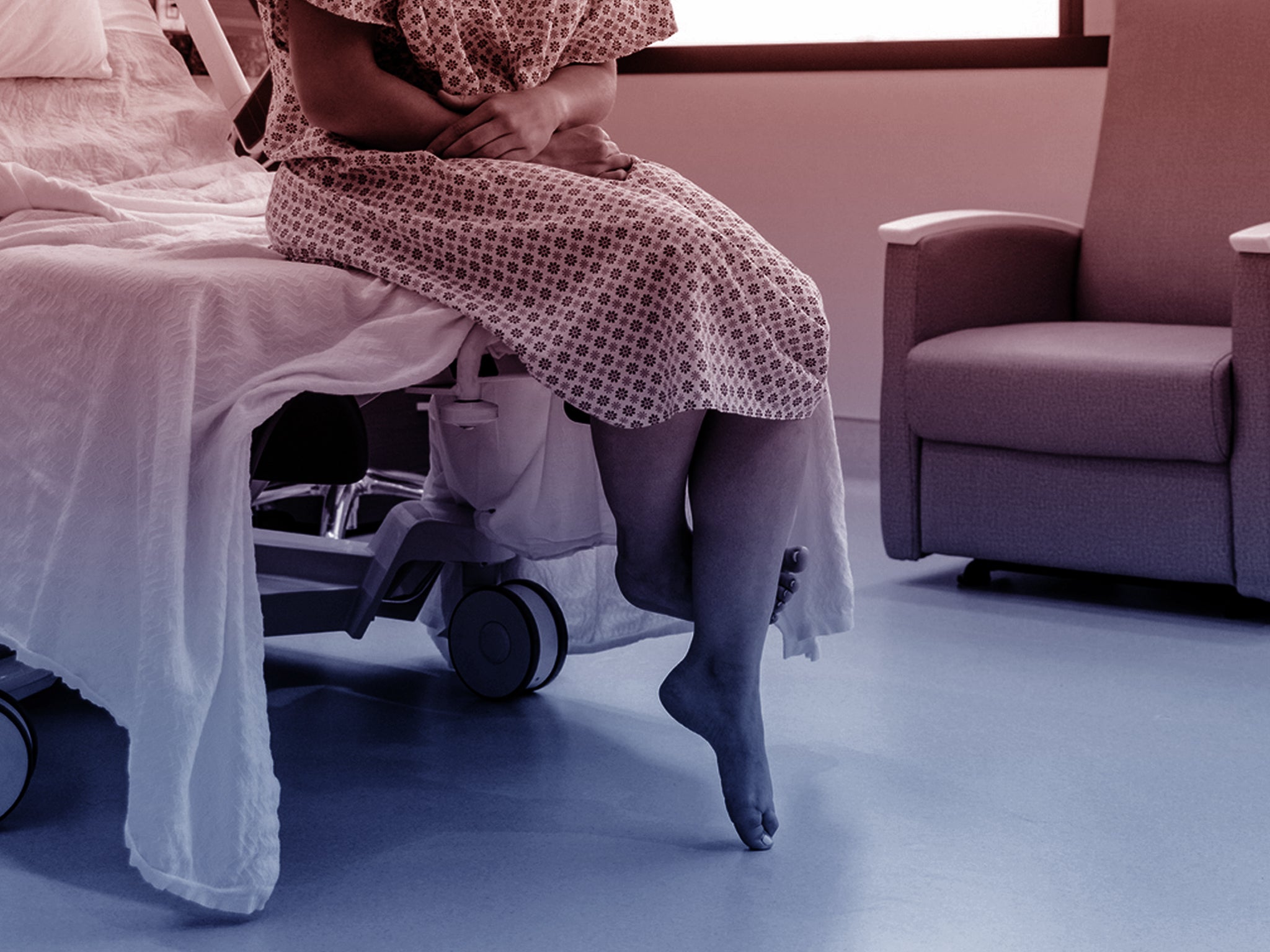‘You’re just going to leave me to die’: Harrowing plea of anorexia patient told she was ‘too thin’ for help
Amy is one of what experts fear is a growing number of patients turned away from treatment as stretched services ‘ration’ help in an effort to manage demand. Health correspondent Rebecca Thomas reports


Your support helps us to tell the story
From reproductive rights to climate change to Big Tech, The Independent is on the ground when the story is developing. Whether it's investigating the financials of Elon Musk's pro-Trump PAC or producing our latest documentary, 'The A Word', which shines a light on the American women fighting for reproductive rights, we know how important it is to parse out the facts from the messaging.
At such a critical moment in US history, we need reporters on the ground. Your donation allows us to keep sending journalists to speak to both sides of the story.
The Independent is trusted by Americans across the entire political spectrum. And unlike many other quality news outlets, we choose not to lock Americans out of our reporting and analysis with paywalls. We believe quality journalism should be available to everyone, paid for by those who can afford it.
Your support makes all the difference.“So you’re just gonna leave me to die? That’s what you’re doing? Because I can’t do that, I’m telling you: I’ve been trying to do that, and I can’t. So now what?”
Over a year on, Amy, whose name has been changed to protect her identity, is still waiting for an answer – and for the help she desperately needs.
The 30-year-old, who has battled anorexia since she was 16 and has been admitted to hospital multiple times, was responding to her eating disorder psychiatrist telling her the service could no longer help her.
Amy was told to try to get better on her own by upping her calorie intake, and was warned that she could only be referred to her GP for emergency help if her BMI dropped below 13. A healthy level is between 18 and 25.
She is just one example of what experts fear is a growing number of patients who are being told they are “too thin” for care, as stretched NHS services attempt to “ration” the help they offer in an effort to manage demand.
In a harrowing session that was recorded and shared with The Independent, Amy was told: “This is an attempt for you to enable yourself more, actually ... For most of our patients, we do this: we set up clear goals, clear plans, because in the past, you have, for example, 100 calories per week. I mean, in one week... it’s really, small, [Amy],” a psychiatrist tells her.
Amy protests and pleads for doctors not to give up on her, saying she is unable to increase her calorie intake on her own.
She says: “If I was able to do the things you’re telling me I need to do, I wouldn’t need you at all ... It’s like telling someone, ‘Oh, you’ve got a broken leg, we’re not going to help you until you can walk on your leg’ ... or if I had depression, ‘We’re not going to treat you because you need to find your own motivation to get happy.’”
Amy complained to the NHS East of England commissioners about the decision by psychiatrists to withdraw her treatment.
In a response seen by The Independent, the service treating Amy admitted the move was not conventional.
“The decision to use this approach is not taken lightly, but is seen as positive risk management, intended to empower the person to meet their goals for recovery with the support of their GP, who will medically monitor their health, with a clear aim of [the service] ultimately engaging the person in active treatment following a period of self-recovery,” it said.
Despite her desperate plea, Amy is still struggling to access NHS treatment 12 months on, and is using her savings to fund an hour a week with a private nurse who is helping her to maintain her weight.
But despite quitting her job to focus on her recovery, and trying to reduce how much exercise she is doing, Amy has been unable to increase her weight enough to restart treatment. She has also not dropped below the BMI threshold of 13, which would allow her to get emergency care.

Leading eating disorder clinician Dr Agnes Ayton fears that Amy is not alone, and that the practice of discharging patients who do not gain weight quickly enough is now common.
She said: “My anxiety is that these practices are probably quite widespread, and there are multiple factors [involved]. One is insufficient funding, and people having to ration the services for those receiving care. There are various spurious justifications for that – one of them is ‘positive risk-taking’, when actually it is putting a patient at risk.
Have you been affected by this story? Email rebecca.thomas@independent.co.uk
“There is a concern that these practices are more widespread than this one case, and we know there is financial pressure on services, and so it could be driven by a lack of resources; another issue is a lack of training for staff.”
‘Positive risk-taking’
Earlier this year, the Royal College of Psychiatrists was forced to respond after a psychiatrist in Norfolk said services should be withdrawn if no change is seen in a patient’s condition, or if their “behaviours” get worse, in a practice known as “positive risk-taking”.
In a letter, the psychiatrist wrote that within the cohort of patients whose eating disorder has lasted for longer than five years, only those who ask for help should be treated. She argued: “The current ‘bed crises’ would be alleviated, as only the patients who benefit from inpatient treatment would be admitted.”
Dr Ayton responded to the letter at the time on behalf of the Royal College of Psychiatrists, setting out a number of arguments against the proposal. She said: “The response to overwhelming pressure should not be to compromise patient safety or to remove patient care. These problems could be alleviated by investing in NHS services.”
She added: “In perhaps the most disturbing section of [the psychiatrist’s] letter, she describes the high mortality rates in eating disorders as inevitable, without considering how they could be reduced, and claims that policies stating that no one should die from an eating disorder ‘might stem from a lack of understanding’ of the nature of eating disorders.”
Dr Ayton said the likelihood of a patient recovering with no support was “minimal”.
The Norfolk and Norwich eating disorder service was criticised by coroner Sean Horsted in 2021 following the death of 19-year-old Averil Hart, who died of anorexia. Mr Horsted said her death was avoidable and was due to neglect.
He said that the Norfolk service had allocated Averil to an “inexperienced psychologist” because of a “severe staffing crisis”, adding that it had failed to provide proactive support or to speak with her father about his concerns that Averil’s health was seriously deteriorating.
Following an inquest into Averil’s death and those of four others in Cambridge, Mr Horsted raised concerns about eating disorder services nationally. He said that the deaths highlighted problems in the training doctors received in treating patients with eating disorders, a lack of monitoring in respect of high-risk patients, and under-reporting of the number of deaths caused by eating disorders.
Guidance on the subject published by NHS England in 2019 states: “Decisions on accepting referrals and discharge should never be made based solely on a person’s BMI, weight, or frequency of bingeing and purging episodes, but should incorporate the person’s goals for treatment and recovery.”
Beyond this, there are no official guidelines on when it is appropriate to discharge a patient – or crucially, when it isn’t.
If you have been impacted by this story and need support you can contact helplines at charity BEAT or Samaritans at 116 123.




Join our commenting forum
Join thought-provoking conversations, follow other Independent readers and see their replies
Comments